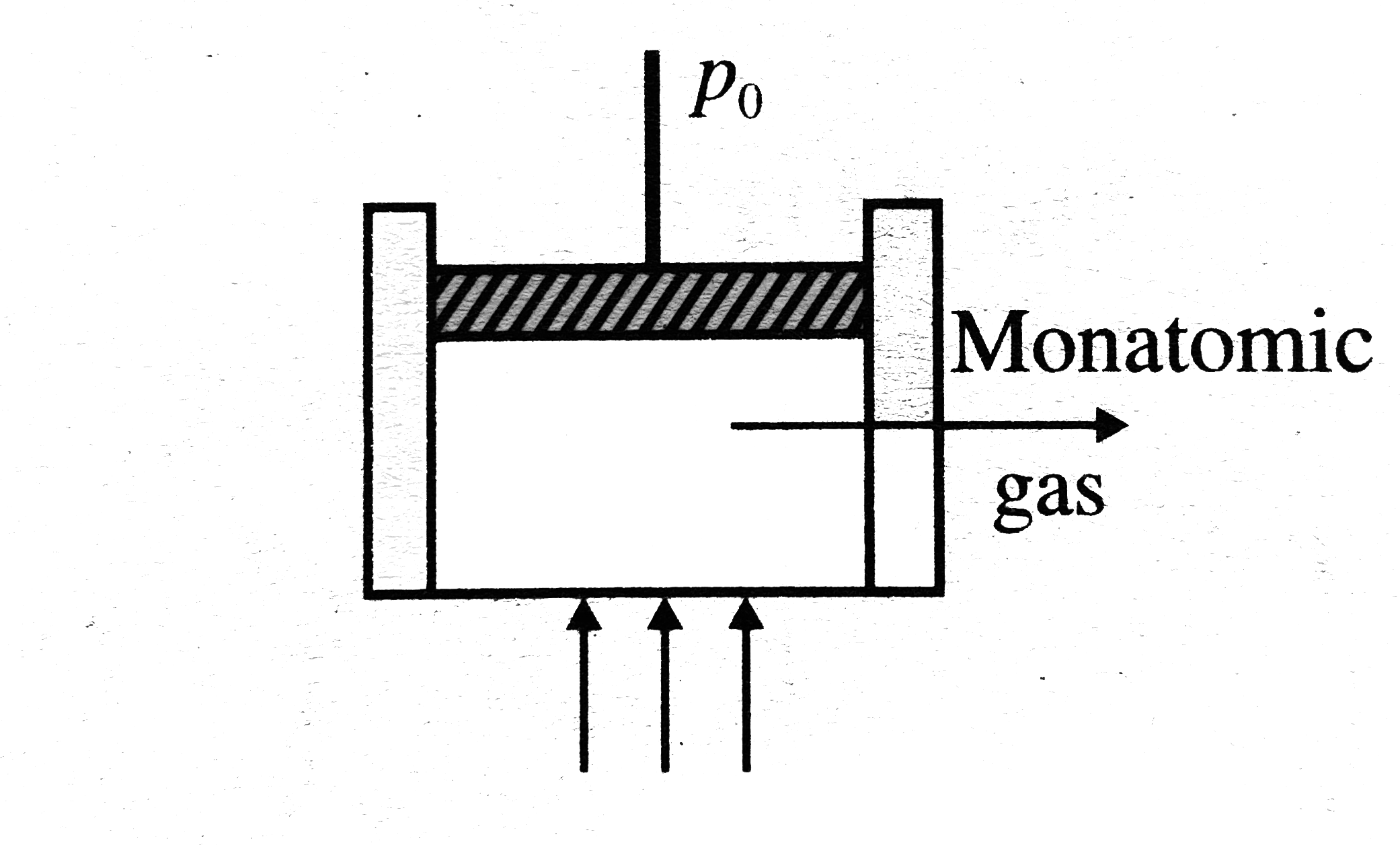An ideal monoatomic gas at temperature 27∘C and pressure 106N/m2 occupies 10L volume. 10,000 cal of heat is added to the system without changing the volume. Calculate the change in temperature of the gas. Given : R=8.31J/mol−K and J=4.18J/cal.
The correct Answer is:C
To solve the problem step by step, we will follow the outlined procedure:
Step 1: Convert the initial temperature to Kelvin
The initial temperature is given as 27∘C. To convert Celsius to Kelvin, we use the formula:
T(K)=T(°C)+273.15
So,
T=27+273.15=300.15K≈300K
Step 2: Convert the volume from liters to cubic meters
The volume is given as 10L. To convert liters to cubic meters, we use the conversion:
1L=10−3m3
Thus,
V=10L=10×10−3m3=0.01m3
Step 3: Use the ideal gas equation to find the number of moles
The ideal gas equation is given by:
PV=nRT
Where:
- P=106N/m2
- V=0.01m3
- R=8.31J/(mol⋅K)
- T=300K
Rearranging the equation to solve for n:
n=PVRT
Substituting the values:
n=(106N/m2)(0.01m3)(8.31J/(mol⋅K))(300K)
Calculating:
n=100002493≈4.01mol≈4mol
Step 4: Calculate the molar heat capacity at constant volume (Cv)
For a monoatomic ideal gas, the molar heat capacity at constant volume is given by:
Cv=32R
Substituting R:
Cv=32×8.31J/(mol⋅K)=12.465J/(mol⋅K)
To convert Cv to calories, we use the conversion 1cal=4.18J:
Cv=12.4654.18≈2.98cal/(mol⋅K)≈3cal/(mol⋅K)
Step 5: Apply the first law of thermodynamics
Since the volume is constant, the work done W=0. Thus, from the first law of thermodynamics:
Q=ΔU
Where ΔU=nCvΔT. Rearranging gives:
ΔT=QnCv
Substituting the values:
Q=10000cal,n=4mol,Cv=3cal/(mol⋅K)
Calculating:
ΔT=100004×3=1000012≈833.33K
Final Answer
The change in temperature of the gas is approximately 833.33K.
---
The initial temperature is given as 27∘C. To convert Celsius to Kelvin, we use the formula:
T(K)=T(°C)+273.15
So,
T=27+273.15=300.15K≈300K
The volume is given as 10L. To convert liters to cubic meters, we use the conversion:
1L=10−3m3
Thus,
V=10L=10×10−3m3=0.01m3
The ideal gas equation is given by:
PV=nRT
Where:
- P=106N/m2
- V=0.01m3
- R=8.31J/(mol⋅K)
- T=300K
n=PVRT
Substituting the values:
n=(106N/m2)(0.01m3)(8.31J/(mol⋅K))(300K)
Calculating:
n=100002493≈4.01mol≈4mol
For a monoatomic ideal gas, the molar heat capacity at constant volume is given by:
Cv=32R
Substituting R:
Cv=32×8.31J/(mol⋅K)=12.465J/(mol⋅K)
To convert Cv to calories, we use the conversion 1cal=4.18J:
Cv=12.4654.18≈2.98cal/(mol⋅K)≈3cal/(mol⋅K)
Since the volume is constant, the work done W=0. Thus, from the first law of thermodynamics:
Q=ΔU
Where ΔU=nCvΔT. Rearranging gives:
ΔT=QnCv
Substituting the values:
Q=10000cal,n=4mol,Cv=3cal/(mol⋅K)
Calculating:
ΔT=100004×3=1000012≈833.33K
The change in temperature of the gas is approximately 833.33K.
Topper's Solved these Questions
- LAWS OF THERMODYNAMICSBOOK - DC PANDEY ENGLISHCHAPTER - LAWS OF THERMODYNAMICSEXERCISE - Exercise 21.1
1 Videos
- LAWS OF THERMODYNAMICSBOOK - DC PANDEY ENGLISHCHAPTER - LAWS OF THERMODYNAMICSEXERCISE - Exercise 21.2
7 Videos
- LAWS OF THERMODYNAMICSBOOK - DC PANDEY ENGLISHCHAPTER - LAWS OF THERMODYNAMICSEXERCISE - Example Type 3
1 Videos
- LAWS OF MOTIONBOOK - DC PANDEY ENGLISHCHAPTER - LAWS OF MOTIONEXERCISE - Medical entrances gallery
39 Videos
- MAGNETIC EFFECT OF CURRENT AND MAGNETISMBOOK - DC PANDEY ENGLISHCHAPTER - MAGNETIC EFFECT OF CURRENT AND MAGNETISMEXERCISE - Integer type Questions
10 Videos
Similar Questions
If 50cal of heat is supplied to the system containing 2mol of an ideal monatomic gas, the rise in temperature is (R=2cal/mol−K)

View SolutionIf 50cal of heat is supplied at constant pressure to the system containing 2mol of an ideal monatomic gas, the rise in temperature is (R=2cal/mol−K)

View SolutionAt 27∘C two moles of an ideal monatomic gas occupy a volume V. The gas expands adiabatically to a volume 2V. Calculate
(a) final temperature of the gas
(b) change in its internal energy and
[ R=8.31J/mol−K]
View SolutionIt is desired to increase of the volume of a gas by 20% without changing the pressure. To what temprature the gas must be heated if the initial temperature of the gas is 27∘C.
View SolutionFive moles of an ideal monoatomic gas with an initial temperature of 150∘C expand and in the process absorb 1500 J of heat and does 2500 J of work. The final temperature of the gas in .∘C is (ideal gas constant R=8.314JK−1mol−1)
View SolutionA gas expands against a constant pressure of 1 atm from a volume of 5L to 10L. During the process, system absorbs 400 J of heat from the surroundings. Calculate the change in the internal energy of the system.
View SolutionCalculate the molar specific heat at constant volume of neon gas.
(R=8.314J mol−1K−1)
View SolutionTwo moles of an ideal monatomic gas occupies a volume V at 27 °C. The gas expands adiabatically to a volume 2V. Calculate (i) the final temperature of the gas and (ii) change in its internal energy.
View SolutionAn ideal gas absorbs 600cal of heat during expansion from 10L to 20L against the constant pressure of 2atm. Calculate the change in internal enegry.
View Solution3000 J of heat is given to a gas at a constant pressure of 2×105N/m2.If its volume increase bny 10 litres during the process find the change in the intrnal energy of the gas.
View Solution
